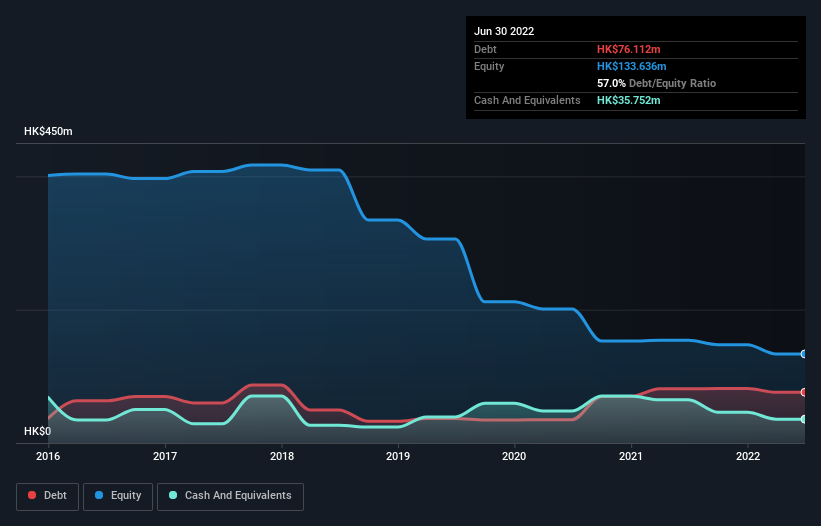- Hong Kong
- /
- Consumer Durables
- /
- SEHK:396
Here's Why Hing Lee (HK) Holdings (HKG:396) Can Afford Some Debt
Howard Marks put it nicely when he said that, rather than worrying about share price volatility, 'The possibility of permanent loss is the risk I worry about... and every practical investor I know worries about.' It's only natural to consider a company's balance sheet when you examine how risky it is, since debt is often involved when a business collapses. Importantly, Hing Lee (HK) Holdings Limited (HKG:396) does carry debt. But should shareholders be worried about its use of debt?
When Is Debt Dangerous?
Debt is a tool to help businesses grow, but if a business is incapable of paying off its lenders, then it exists at their mercy. In the worst case scenario, a company can go bankrupt if it cannot pay its creditors. While that is not too common, we often do see indebted companies permanently diluting shareholders because lenders force them to raise capital at a distressed price. Having said that, the most common situation is where a company manages its debt reasonably well - and to its own advantage. The first step when considering a company's debt levels is to consider its cash and debt together.
Check out our latest analysis for Hing Lee (HK) Holdings
What Is Hing Lee (HK) Holdings's Debt?
As you can see below, Hing Lee (HK) Holdings had HK$76.1m of debt at June 2022, down from HK$81.2m a year prior. On the flip side, it has HK$35.8m in cash leading to net debt of about HK$40.4m.

How Strong Is Hing Lee (HK) Holdings' Balance Sheet?
The latest balance sheet data shows that Hing Lee (HK) Holdings had liabilities of HK$114.7m due within a year, and liabilities of HK$7.47m falling due after that. Offsetting this, it had HK$35.8m in cash and HK$32.2m in receivables that were due within 12 months. So its liabilities outweigh the sum of its cash and (near-term) receivables by HK$54.2m.
This is a mountain of leverage relative to its market capitalization of HK$79.2m. This suggests shareholders would be heavily diluted if the company needed to shore up its balance sheet in a hurry. There's no doubt that we learn most about debt from the balance sheet. But you can't view debt in total isolation; since Hing Lee (HK) Holdings will need earnings to service that debt. So when considering debt, it's definitely worth looking at the earnings trend. Click here for an interactive snapshot.
Over 12 months, Hing Lee (HK) Holdings made a loss at the EBIT level, and saw its revenue drop to HK$145m, which is a fall of 29%. To be frank that doesn't bode well.
Caveat Emptor
While Hing Lee (HK) Holdings's falling revenue is about as heartwarming as a wet blanket, arguably its earnings before interest and tax (EBIT) loss is even less appealing. Indeed, it lost HK$3.8m at the EBIT level. When we look at that and recall the liabilities on its balance sheet, relative to cash, it seems unwise to us for the company to have any debt. So we think its balance sheet is a little strained, though not beyond repair. However, it doesn't help that it burned through HK$23m of cash over the last year. So suffice it to say we consider the stock very risky. The balance sheet is clearly the area to focus on when you are analysing debt. But ultimately, every company can contain risks that exist outside of the balance sheet. For example Hing Lee (HK) Holdings has 4 warning signs (and 2 which are potentially serious) we think you should know about.
Of course, if you're the type of investor who prefers buying stocks without the burden of debt, then don't hesitate to discover our exclusive list of net cash growth stocks, today.
Valuation is complex, but we're here to simplify it.
Discover if Hing Lee (HK) Holdings might be undervalued or overvalued with our detailed analysis, featuring fair value estimates, potential risks, dividends, insider trades, and its financial condition.
Access Free AnalysisHave feedback on this article? Concerned about the content? Get in touch with us directly. Alternatively, email editorial-team (at) simplywallst.com.
This article by Simply Wall St is general in nature. We provide commentary based on historical data and analyst forecasts only using an unbiased methodology and our articles are not intended to be financial advice. It does not constitute a recommendation to buy or sell any stock, and does not take account of your objectives, or your financial situation. We aim to bring you long-term focused analysis driven by fundamental data. Note that our analysis may not factor in the latest price-sensitive company announcements or qualitative material. Simply Wall St has no position in any stocks mentioned.
About SEHK:396
Hing Lee (HK) Holdings
An investment holding company, engages in the design, manufacture, marketing, sale, and export of home furniture products in the People's Republic of China, rest of Asia, Europe, and the United States.
Flawless balance sheet average dividend payer.
Market Insights
Community Narratives



